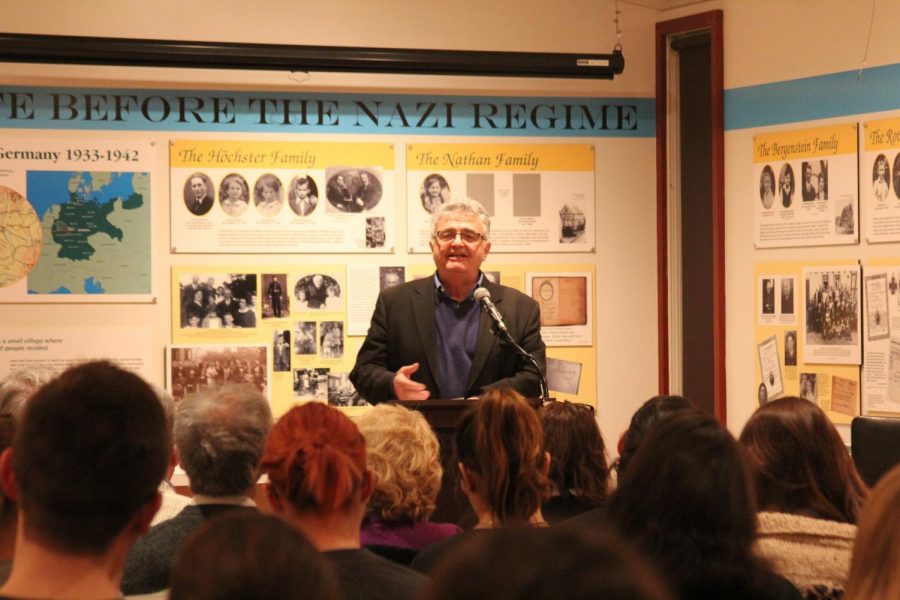Over 50 people gathered in the Institute for Holocaust, Genocide and Memory Studies at the University of Massachusetts on Wednesday night as the institute hosted a five-person panel discussing some of the subtler causes that led to the Holocaust.
The panel consisted of Omer Bartov, the John P. Birkelund distinguished professor of European history at Brown University; Alison Frank Johnson, a professor of history and Germanic languages and literature at Harvard University; Jan T. Gross, a professor of history emeritus at Princeton University; Larry Wolff, the Julius Silver professor of History at New York University and the director of the NYU Center for European and Mediterranean Studies; and Alon Confino, a professor of history and Jewish studies at UMass and the director of the IHGMS.
The panel was primarily centered around Bartov’s new book, “Anatomy of a Genocide: The Life and Death of a Town Called Buczacz.” In the book, Bartov argues that the Holocaust was not just arbitrated by major political and military actors, but it came about due to smaller, more local grudges and biases that manifested itself in large-scale killing.
“It was an intimate kind of genocide. It was a genocide in which many of the people were killed where they live by their neighbors, and in many cases, just like in Buczacz and all over Eastern Europe, they are still there, in mass graves,” Bartov said. “People, whether they remember it or not, whether they want to suppress that memory or they want to commemorate it, they are living right next to the murdered.”
Preceding the panel discussion, Wolff gave a presentation on Galicia, a region located in Eastern Europe. The region held many Jewish citizens before being liquidated in 1918 and 1919; however, the region remained as a major cultural force for many people even after its liquidation. The town of Buczacz, a major focus of Bartov’s book, is located in what was Galicia, and the region is the setting of many of the grudges that Bartov argues helped lead to the genocide.
Following Wolff’s presentation, Gross and Johnson gave comments and asked questions regarding Bartov’s book. Gross took particular note of the agency of individuals during the Holocaust and stated that the decisions made by individual people were a major aspect of the Holocaust, not simply just the actions of the Nazis.
Gross said, “Everybody in the place was making decisions, was committing to one course of action rather than other, and the imagining of Holocaust in which we see this sort of superior force, destiny, Hitler decided trains are rolling, extermination camps are there, people are just rounded up…in a sense an industrial killing, this is just part of the story.”
On the other hand, Johnson looked to examine and critique the title of the book, and in her time to speak, presented an alternative title that she felt captured the concept of family that Bartov presents in his book.
“The first alternate metaphor I thought of was actually ‘Genealogy of Genocide,’” Johnson said. “You say early on in the book that all history is family history and in a sense, what you present to us is an image of Buczacz as a very dysfunctional family with all of the intimacy we associate with family and all of the many complex relationships, some which are profoundly beautiful and productive, and some of which are brutal and destructive.”
Toward the end of the panel discussion, Bartov gave his own account of the book and its writing, while also responding to the other panelists. Bartov explained that the idea for the book came during the 1990s.
According to Bartov, after the downfall of Communism and the occurrences of the Bosnian and Rwandan Genocide, he started to look at genocides differently, ultimately leading to writing the book.
Bartov later explained how the Germans were able to commit genocide in the region so quickly, and that in Buczacz and the surrounding region, only about 20 to 30 Germans were able to kill around 60,000 Jewish people. To Bartov, this “efficiency” comes from “the way people thought of each other before the Germans came,” as the animosity between individuals in the region made the genocide far easier once the Germans took power.
During the discussion, Confino noted the book’s ability to shed light on many of the motivations that led to the Holocaust.
“[The book] takes the years before the second World War and the multi-ethnic relations and conflicts, not simply as a background but as a story for which we are able to understand the agency of people during the war, so that we can understand the motivations.”
Following the discussion, the panelists took questions from the audience, and the event was concluded with a reception where audience members could converse with the panelists.
Will Mallas can be reached at [email protected] and followed on Twitter @willmallas.





















amy • Dec 6, 2018 at 11:19 pm
What do hitler and Pol Pot have in common? They were both socialists.
NITZAKHON • Dec 6, 2018 at 7:08 am
Another thing that aided in the Shoah was the disarming of the people. Why – WHY – are my fellow Jews so insistent on gun control when our history shows us, as the article clearly describes, a few armed people can slaughter thousands?
http://redpilljew.blogspot.com/2018/11/never-again-why-are-most-american-jews.html
And I know, I know, modern military vs. “Wolverines”. Perhaps you should read this take on things:
monsterhunternation.com/2018/11/19/the-2nd-amendment-is-obsolete-says-congressman-who-wants-to-nuke-omaha/